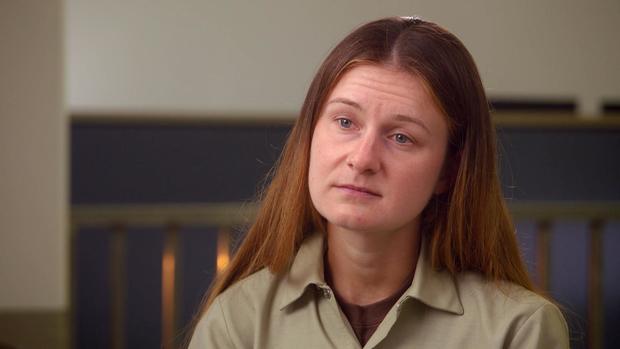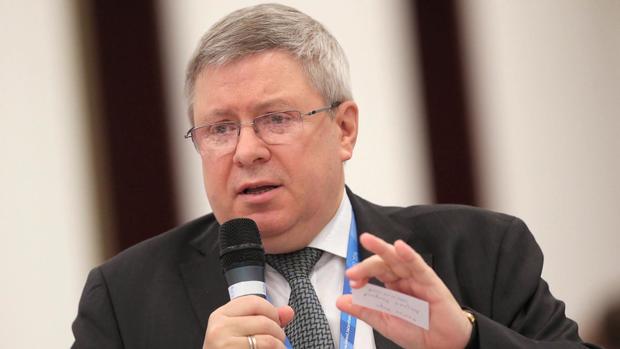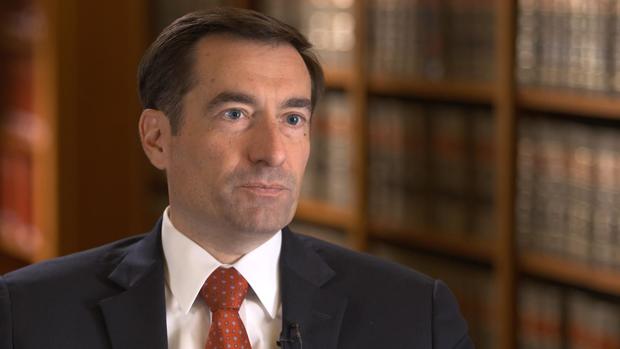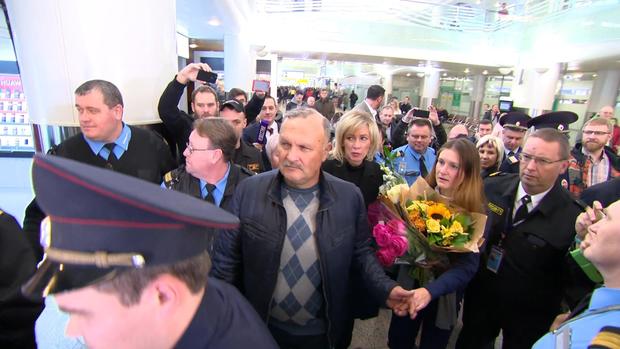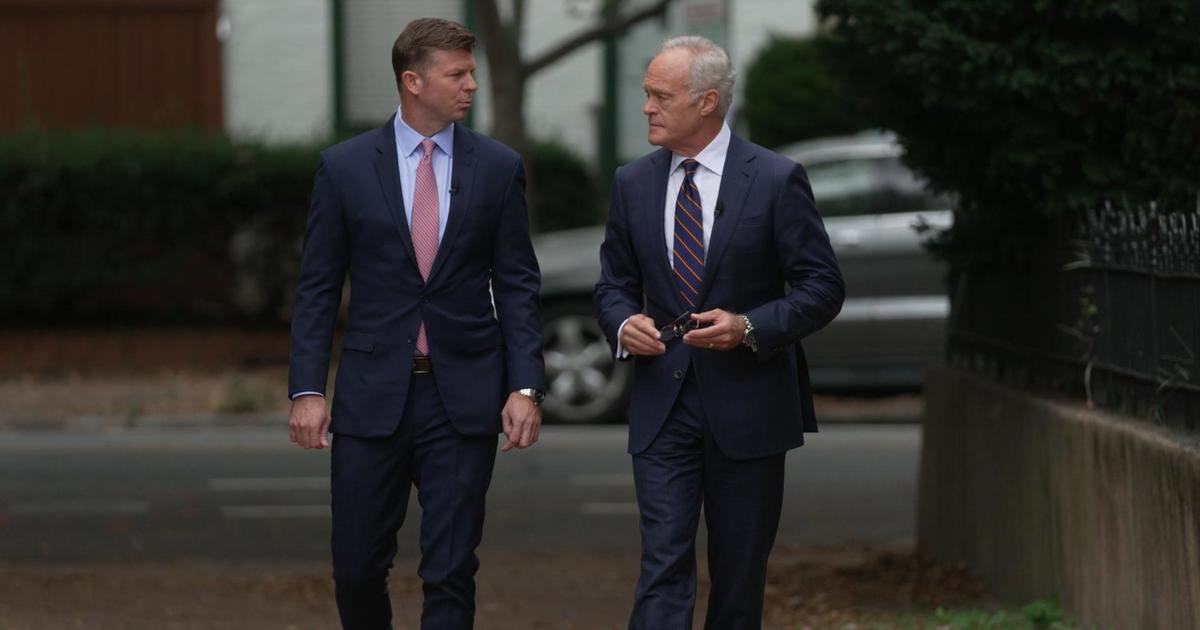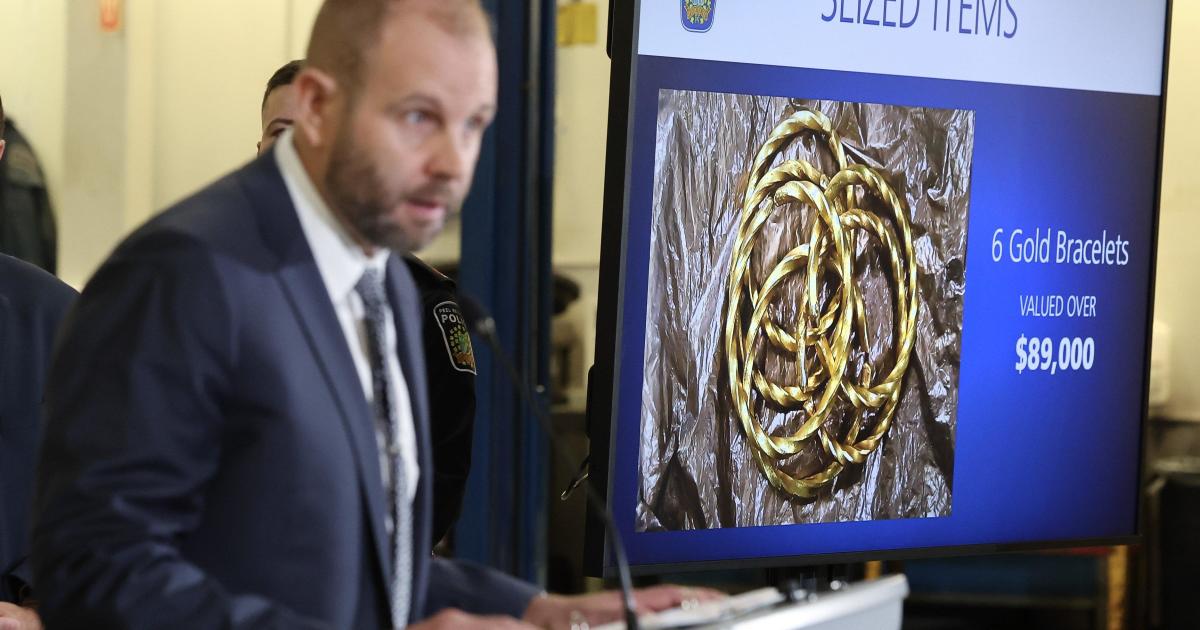Maria Butina: The Russian accused of trying to influence U.S. policies for the Kremlin
It's rare that Russian agents come out from the shadows. But tonight you will hear from 30-year-old Maria Butina, who was front page news when she was charged, not with espionage, but with acting as an agent of a foreign government and not registering with the U.S. government. A judge in her case said Butina sought to collect information that could be helpful to the Russian government, under the direction of a Russian official, at a time when the Russian government was interfering in our electoral process.
There was no trial because Butina, who was here on a student visa, cooperated and pled guilty to conspiring to act as a foreign agent. After serving time in a federal prison, she was just deported back to Moscow.
Maria Butina was arrested on July 15, 2018, portrayed at the time as a sexy covert agent, planted by the Putin government to infiltrate the NRA. Photos of Butina at NRA events were posted by her on her own social media accounts.
They're a far cry from the young woman we met while she was still an inmate at a federal prison in Tallahassee, Florida
The dazzle was gone, replaced by resentment and defiance. Her story, she told us, began in Siberia where she grew up, hunting with her dad. After university, she moved to Moscow, and said she started a group called "The Right to Bear Arms."
Lesley Stahl: You were seeking a second amendment for Russia. Is that correct?
Maria Butina: We were trying to get the changes in Russian law that would allow guns for self-defense.
Lesley Stahl: Okay. So you hear that, an American hears that, and they say, "Come on, Putin is not going to allow people to run around owning guns." Here's the case against you, that you started this organization as a way to infiltrate the NRA here to meet people as a way in to influence us.
Maria Butina: That's nonsense.
Lesley Stahl: But you did that. You used your organization to meet people in the NRA.
Maria Butina: The NRA, for us, has always been an example. Because there is no more powerful lobbyist gun group in the world than the NRA. Learning from them was an honor.
Her introduction to the NRA was facilitated by this man, Alexander Torshin, a Russian official, who she has admitted in court papers, directed her activities in the U.S.. Butina met him, she says, when he attended one of her gun rights rallies in Moscow.
We obtained thousands of private Twitter messages they sent each other over two and a half years.
Lesley Stahl: Was he close to Putin?
Maria Butina: I don't think so.
Lesley Stahl: So you wrote him a message and you said, "You are an influential member of [Putin's] team." Your words.
Maria Butina: It doesn't suggest he's close to Putin in any way.
Lesley Stahl: But was he an influential member of Putin's team?
Maria Butina: I don't know.
Lesley Stahl: Well, you wrote that. You know, in reading through your messages it reads as if he's-- your intelligence case officer.
Maria Butina: Look, this is-- I think it's an American, very old saying that suggests that wolves have teeth, but not all animals with teeth are wolves. You cannot judge a person based on appearance.
Her appearance changed after she met Torshin, becoming something of a celebrity, posing glamorously with guns in GQ Russia and on her own Instagram account.
Around that time in Moscow she met with David Keene, the former president of the NRA. And other members like Paul Erickson, who would become Butina's boyfriend.
Lesley Stahl: You got to the point where you were staging rallies. You were holding conferences, or at least one big conference where you brought the NRA people from the United States over to Moscow. And you're a kid from Siberia. And I'm having trouble knowing how a young person is able to pull this off.
Maria Butina: That's a great question to ask here in America. Because there were times when people didn't believe that women are capable to be leaders at all.
Lesley Stahl: That wasn't a sexist question.
Maria Butina: Because-- that it is. Because-- I was--
Lesley Stahl: No, no, no, I'm saying you're a young person. You're 23 years old.
Maria Butina: But this is exactly the same. How can one judge me and say what, I was too smart for my age? I think that is what is praised in America. When a young person takes his or her destiny in his own hands and fights.
Lesley Stahl: You traveled across the United States, attending NRA meetings. The U.S. government says that you were making connections with Republicans so that you could influence U.S. policy, and you were doing it slowly but deliberately.
Maria Butina: If I were not Russian, that would be called social networking.
Lesley Stahl: Have you ever had a case like this?
John Demers, the assistant attorney general for national security, whose office helped prosecute Butina, says what she did wasn't social networking and wasn't on her own initiative. I quoted Butina's lawyer Bob Driscoll.
Lesley Stahl: Maria is not a spy. She knows of no secret codes. There were no safe houses. In other words, she was completely open and there was no espionage.
John Demers: Her lawyer is right, that she didn't get, as far as we know, classified information. Right. And so—but that's not what she was doing here. She was an influence agent. She was getting access to Americans who she thought were close to power in America.
Lesley Stahl: What was the actual crime?
John Demers: The law she broke was being here acting as an agent of the Russian government while she was here, and pretending that she wasn't.
Lesley Stahl: Is that a law?
John Demers: It's one of the laws that we have to combat foreign influence. What makes her so dangerous, is that the people who she's contacting, don't know that she's there taking direction from the Russian government.
She first came to the U.S. in 2014 to attend NRA conventions, where she posted photos with prominent Repubicans: Scott Walker, Bobby Jindal, Rick Santorum…
Lesley Stahl: Her argument is: I'm some spy. You know, here I am showing myself with these people all over the place. I'm not hiding.
John Demers: She's hiding her true identity. That's her face, but she's not telling them that she's there as an agent of Russia.
In one of her private messages to her contact in Moscow, Alexander Torshin, she wrote: "Are we allowed to publish the photo of Trump Jr.?"
As if they needed to run the decision up to a more senior level. There were other hints of a higher authority when she organized meetings in Moscow in December 2015 between senior NRA members and top Russian officials including Torshin.
Lesley Stahl: When you see this, again, you can get the impression that there's some government person higher than Torshin kinda directing this whole thing, pulling the strings.
Maria Butina: But it's all conspiracy theories. There is absolutely no proof of any of that, and I am not aware of any actions like this.
She didn't just attend NRA events. Here she is in the summer of 2015 at a Libertarian convention in Las Vegas called FreedomFest, where she asked then-candidate Donald Trump a question.
Butina at FreedomFest: Do you want to continue the politics of sanctions that are damaging on both economies or you have any other ideas?
Trump at FreedomFest: I don't think you'd need the sanctions. I think that we would get along very, very well.
Lesley Stahl: One of the goals of the Russian government at this point in time was to get rid of those sanctions. It was a major goal.
Maria Butina: It was also a major goal for every Russian citizen that suffers today from these sanctions, I believe that our countries shall not fight.
Lesley Stahl: So you asked about sanctions and not gun rights because you want us to be friends.
Maria Butina: Absolutely.
Not long after she began helping organize U.S.-Russian friendship dinners. In a document sent to Torshin, she wrote that these dinners "will make it possible to exert the speediest and most effective influence on the process of making decisions in the American establishment."
Lesley Stahl: That's pretty explicit, that you're seeking to influence U.S. policy.
Maria Butina: It's pretty explicit that I am seeking that our two countries establish friendship between each other. And I don't mean governments, I mean people.
As the 2016 U.S. Election was approaching, she claimed to have success making direct contact with several of Donald Trump's Russian advisors.
And she writes Torshin: "We made our bet. I am following our game."
Torshin answers: "…this is the battle for the future, it cannot be lost… patience and cold blood…"
A week later, Butina writes: "…only ingognito! Right now everything has to be quiet and careful."
Lesley Stahl: So incognito, patience, cold blood. What is that?
Maria Butina: Let me take you back to 2016, around the election's time. Do you remember how at that point American media treated Russia? Everything was toxic. Tell me that there is no racism here against the Russians? Oh, please. It is.
I reminded her that the judge said her crime was a threat to our democratic institutions.
Maria Butina: And it is very sad for me, because it shows how broken the justice system in the United States is.
Lesley Stahl: You're saying she's wrong--
Maria Butina: Because-- absolutely wrong. Because the-- you cannot charge a person with a crime for collecting information with not specifying what information. I have never collected any sensitive or classified information.
Lesley Stahl: They're saying you sought to influence our policies.
Maria Butina: I never sought to influence your policies. I came here on my own because I wanted to learn from the United States and go back to Russia to make Russia better.
The Justice Department taped our interview with Butina, which John Demers listened to.
John Demers: It was a masterpiece of disinformation. It had conflation, obfuscation, changing the subject, accusing you of being sexist, accusing the American people of being racist against Russians whenever the questions got difficult… trying to change the topic. Partial denials.
Lesley Stahl: So there's no way to look at what she was doing here as being somewhat naïve and innocent?
John Demers: I don't think that she's naïve or innocent.
Less than a week after Donald Trump won the election, Butina was claiming to her contact Alexander Torshin that she had influence over at least one of the cabinet choices. "John bolton will be secretary of state, 90%," she writes and continues…
Lesley Stahl: "Ask our people if they're happy with that. Our opinion will be taken into account." What does that mean?
Maria Butina: Well, Lesley Paul told me to write that.
Paul Erickson, her former boyfriend and a Republican operative.
Maria Butina: I hesitated to write that, but I thought it might—you know, it was a certain way to show off to Torshin and say, "Well, maybe I have high-level contacts here."
Lesley Stahl: Do you think she had influence over who was chosen?
John Demers: I doubt it. I think she intended to have influence over who was chosen. and I think what makes her dangerous is that at the end of the day we don't know.
One the things she wanted to talk about were the conditions in the Washington D.C. jail where she was first held. Cockroaches were everywhere she claimed. No mattresses or blankets. And...
Lesley Stahl: You told me that you found faith?
Maria Butina: No. God found me. He was always there. And helped me to go through all these tough days.
That included over 100 days in solitary confinement.
Maria Butina: It is a torture. It is not normal for a human being to be locked for 23, 20, 22 hours in a cell by your own. Do you really think for not filing the paper you deserve 18 months of incarceration, four months in solitary confinement, and all this experience in jail? Is that the way?
John Demers: When she was talking to you in your interview, her audience wasn't the American people. It was Vladimir Putin and all the people in Russia who are going to decide her fate when she goes back there.
Lesley Stahl: Are you worried that she's going to go around the country, criticizing, you know: "How dare the Americans talk about human rights, look what happened to me."
John Demers: And I have very little doubt that the Russian government will leverage her as an instrument of propaganda to say: "Here was this poor, young, idealistic Russian student and look what happened to her. They threw her in jail for 18 months."
When she arrived back in Moscow a week ago, she was greeted by a media frenzy, had a reunion with her dad, and immediately started giving interviews about the conditions of her incarceration.
Produced by E. Alexandra Poolos. Associate producers, Sarah Turcotte and Will Croxton.
